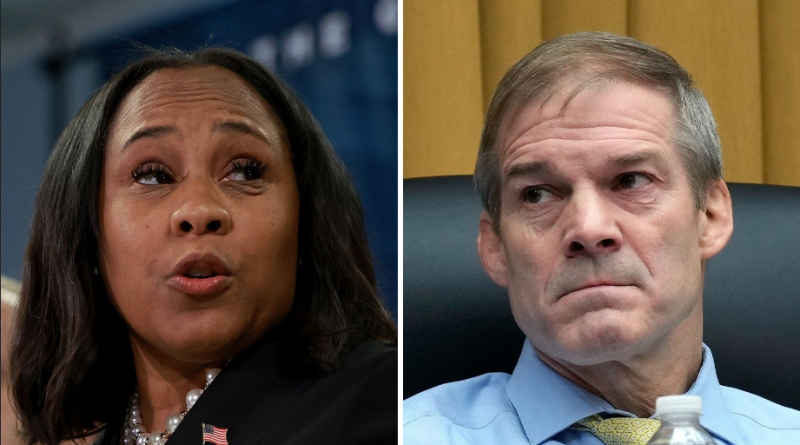Unveiling the Truth: The Jordan-Willis Exchange
The American political landscape is often a theater of deep-seated divisions, where the relentless pursuit of power can overshadow the foundational principles of justice and truth. The recent correspondence between Jim Jordan and Fani T. Willis vividly epitomizes this dynamic. In this exchange, Jordan levies a series of politically charged accusations against Willis, who counters with rational and evidence-based responses. This essay delves deep into the nuances of this dialogue, providing a detailed analysis of the accusations and responses, and scrutinizing the merit of Jordan’s claims in light of Willis’ evidence-based rebuttals.
Jordan’s Accusations
In his letter, Jim Jordan vehemently criticizes Willis for her role in bringing a 41-count indictment against 19 defendants, including former president Donald Trump, alleging a politically motivated agenda behind the move. Jordan points to a series of events, such as the launch of Willis’ campaign fundraising website which highlighted her investigation into Trump, and media appearances by the grand jury forewoman expressing excitement over subpoenaing Trump, as evidence of a politically charged investigation.
Jordan also raises concerns about the timing of the prosecution, suggesting it is designed to interfere with the 2024 presidential election, given its proximity to key dates in the electoral calendar. He further accuses Willis of attempting to regulate the conduct of federal officers through state criminal law, thereby undermining the operations of the federal government and potentially violating the Supremacy Clause and the First Amendment.
Willis’ Measured and Evidence-Based Responses
In response to Jordan’s accusations, Willis offers rational and evidence-based rebuttals, systematically addressing each point raised. She firmly rejects the notion of political motivations driving the indictment, emphasizing the gravity of the allegations and the necessity for a thorough investigation grounded in evidence.
Willis clarifies that the timing of the prosecution was a result of a meticulous investigative process, not a strategy to influence the upcoming presidential election. She defends her office’s integrity, highlighting the adherence to legal provisions and transparency in the utilization of resources, including federal funds.
In response to concerns over the potential criminalization of federal officers’ actions, Willis underscores that holding a high office does not grant immunity from legal scrutiny, thereby upholding the principle of equality before the law. She also dismisses the insinuations of improper coordination with DOJ Special Counsel Jack Smith, asserting the independence and impartiality of her office in conducting the investigation.
Comparative Analysis of the Rationales
Comparing Jordan’s politically motivated accusations with Willis’ rational and evidence-based responses, a clear distinction emerges between speculative allegations and a defense rooted in legal principles and evidence-based reasoning. Jordan’s approach mirrors his committee’s recent unsuccessful attempts to find evidence of criminal activities tied to Joe Biden, showcasing a pattern of leveraging accusations devoid of substantial evidence for political gains.
In contrast, Willis’ responses reflect a commitment to uphold the law impartially, emphasizing a meticulous approach to the legal process and a dedication to truth and justice, which stands in stark contrast to Jordan’s baseless accusations.
Conclusion
The Jordan-Willis exchange offers a microcosm of the broader political dynamics at play in contemporary America, where the pursuit of power often eclipses the pursuit of truth. Through a detailed analysis of the exchange, it becomes evident that Willis’ rational and evidence-based rebuttals not only defend the integrity of her office but also uphold the principles of justice and truth that should be the cornerstone of democratic institutions. It is a reminder that in the face of politically motivated accusations, the adherence to truth and evidence remains the ultimate defense, urging a return to principles over political maneuvering in the pursuit of justice.

